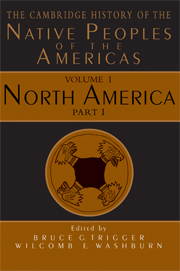Book contents
- Frontmatter
- 1 Native views of history
- 2 Native peoples in Euro-American historiography
- 3 The first Americans and the differentiation of hunter-gatherer cultures
- 4 Indigenous farmers
- 5 Agricultural chiefdoms of the Eastern Woodlands
- 6 Entertaining strangers: North America in the sixteenth century
- 7 Native people and European settlers in eastern North America, 1600–1783
- 8 The expansion of European colonization to the Mississippi Valley, 1780–1880
- Index
- References
8 - The expansion of European colonization to the Mississippi Valley, 1780–1880
Published online by Cambridge University Press: 28 March 2008
- Frontmatter
- 1 Native views of history
- 2 Native peoples in Euro-American historiography
- 3 The first Americans and the differentiation of hunter-gatherer cultures
- 4 Indigenous farmers
- 5 Agricultural chiefdoms of the Eastern Woodlands
- 6 Entertaining strangers: North America in the sixteenth century
- 7 Native people and European settlers in eastern North America, 1600–1783
- 8 The expansion of European colonization to the Mississippi Valley, 1780–1880
- Index
- References
Summary
For Eastern Indians and the United States both, the century from 1780 to 1880 was a period of experimentation, learning, adjusting, and ultimately, struggling for dominance over the land and its resources. During that century, Native Americans experienced steady decline in population and power. While they won important victories through warfare, politics, and judicial action, in the end they lost all but tiny remnants of their lands east of the Mississippi. Required to relocate west of the river in Indian Territory, their numbers continued to decline even as they attempted, often quite successfully, to build new lives and communities in unfamiliar country. But the combined effects of the American Civil War and the economic penetration of corporate America brought a second round of defeats so that by 1880 the nations of Indian Territory, like those scattered groups that had avoided removal and remained in the East, were surrounded and in imminent danger of dispossession and fragmentation.
The Indian policy of the United States government during its first century was not designed to exterminate Native Americans, but it was created to meet the needs and wishes, economic, political, and spiritual, of its citizens. Those needs and wishes rarely coincided with the interests of Native Americans and, when in conflict, Indians, often denigrated as culturally and racially inferior, found themselves overwhelmed by the superior power of federal and state governments. Humanitarian interests in the United States decried the suffering of Native people and struggled to alleviate it, but the methods and goals of the well-meaning required a cultural transformation so complete that most Indians rejected it.
- Type
- Chapter
- Information
- The Cambridge History of the Native Peoples of the Americas , pp. 461 - 538Publisher: Cambridge University PressPrint publication year: 1996



